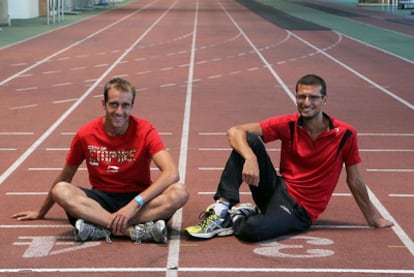Track & field split by doping case
Greyhound probe yet to lead to convictions, but some athletes have taken note
On December 9, 2010, Spanish track & field was dealt a serious blow. The Civil Guard's anti-doping Operation Greyhound produced arrests, searches, and perhaps most memorably, the image of Marta Domínguez, Spain's highest-profile female sportswoman, caught up in the complex network of illegal practices.
On the morning that the arrests were announced, as the media buzzed with rumors, Ángel David Rodríguez, Spain's fastest athlete, turned up for his daily training session at the state-funded National Physical Education Institute (INEF). "But I spent the whole time looking at Twitter and Facebook on my cellphone. The whole story came out, that they had searched Marta's house, and that the police had arrested this or that person," he says.
Spanish athletics is a small world where everybody knows everybody else. The country's top sportsmen and women meet in competitions, they travel together, and often train together. In recent years they have grown used to talking to each other via social networks; and following Operation Greyhound, they increasingly used social media to share information about what was going on, and in some cases, to distance themselves from the allegations of widespread doping and other illegal practices.
After the initial shock, many athletes say that they were angry about being tarred with the same brush as colleagues who had been arrested, and soon decided to make their anger public. They drew up a statement pointing out that most Spanish athletes were not involved in doping. "It wasn't against anybody in particular," says marathon runner Pablo Villalobos, who along with Rodríguez, were among those organizing the campaign.
"We wanted to let people know that the country's top athletes were completely behind the authorities in cracking down on doping, and not just through routine controls and checks at events, but if necessary through the police and the courts," adds Villalobos.
Seven months later, Spanish track & field is divided over Greyhound: some say that those under investigation are being persecuted, while others insist that a thorough clean-up is required. The division manifests itself at events such as the European Indoors Athletics Championships earlier this year, when Nuria Fernández, who trained with coach Manuel Pascua - implicated in the investigation - received a cool reception from teammates, or in the decision to drop Digna Luz Murillo from the national team for continuing to work with Pascua.
"It depends on the relationship that you had before the affair," says Villalobos. "You really notice the division between athletes who used to see each other daily. Everything has changed; everybody knows which side they are on, but we are adults, and we have come here to train."
Marta Domínguez, who never tested positive for banned substances, has since been absolved of any involvement in doping. That said, the judge overseeing the investigation has refused to confirm Domínguez's denials. For its part, the CSD Sports Council is still waiting for the tests that would establish definitively that she did engage in doping, and can do nothing until then. Plans to ban athletes being investigated for doping from competing in international events have come to nothing.
"But this is a point of no return," says Villalobos. "There is no way from now on that anybody who takes illegal substances will be able to get away with it," adds Rodríguez. Both agree that the fight against doping needs to be kept up. "The only way to deal with these kinds of cases is to be tough. If we give the impression that we are being lax, that anything goes, then doping will continue. The fight against doping needs to begin in school; it's an ethical issue, because we also know that there will always be substances that cannot be detected. [...] It's not about saying 'I haven't been caught;' it's about being able to say, 'I have never taken anything'."

Tu suscripción se está usando en otro dispositivo
¿Quieres añadir otro usuario a tu suscripción?
Si continúas leyendo en este dispositivo, no se podrá leer en el otro.
FlechaTu suscripción se está usando en otro dispositivo y solo puedes acceder a EL PAÍS desde un dispositivo a la vez.
Si quieres compartir tu cuenta, cambia tu suscripción a la modalidad Premium, así podrás añadir otro usuario. Cada uno accederá con su propia cuenta de email, lo que os permitirá personalizar vuestra experiencia en EL PAÍS.
¿Tienes una suscripción de empresa? Accede aquí para contratar más cuentas.
En el caso de no saber quién está usando tu cuenta, te recomendamos cambiar tu contraseña aquí.
Si decides continuar compartiendo tu cuenta, este mensaje se mostrará en tu dispositivo y en el de la otra persona que está usando tu cuenta de forma indefinida, afectando a tu experiencia de lectura. Puedes consultar aquí los términos y condiciones de la suscripción digital.








































